School Councils and Area Governance
[Archive from 2005]
Area and place-based planning is critical for the future welfare of *all* young people making the transition from School to work and further study. School Councils and other governing bodies play a key rule in developing new structures to support entire communities education and employment outcomes.
On Tuesday night the 26th of April [2005], almost 60 people representing 11 School communities and their college’s council or governing board, met with the Chairperson of the Victorian Learning and Employment Skills Commission [VLESC], Mr. Peter Thomas, at a dinner forum hosted by the Central Ranges Local Learning and Employment Network at the outstanding Lancemore Hill Conference Centre.
Also in attendance was VLESC Commissioner Rowena Allen and President of the Association of Victorian School Councils, Mr. Stephen Franzi-Ford.
Mr. Gerard Hard, Chairperson of the CRLLEN Board, welcomed the assembled School Principals, School Council Presidents and councillors from Local Governments in the Macedon, Mitchell and Murrindindi Shires.
Mr. Hard pointed out how gratifying it was to see such representation from all sectors of the schools across the LLEN area.
Attending on the evening were representatives on School Councils from:
- Kyneton Secondary College
- St Mary’s College, Seymour
- Yea High School
- Sacred Heart College, Kyneton
- Assumption College, Kilmore
- Seymour Special School
- Seymour Technical High School
- Gisbourne Secondary College
- Alexandra secondary College
- Broadford Secondary College
- Braemar College, Macedon.
Member for Seymour, Mr. Ben Hardman, in introducing Peter Thomas, remarked that seeing all the Government, Catholic and Independent schools in attendance, was quite an historic occasion and credit should go to the Board of the LLEN and each college community for looking for ways to worktogether to improve outcomes for young people in the region.
Peter Thomas spoke to the forum for approximately ten minutes and took questions from the floor. Mr. Thomas outlined the role of the VLESC, highlighting that the VLESC;
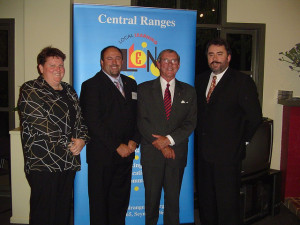
- has a broad advisory role to Government on post compulsory education, training and employment
- is the State training agency and executes responsibility for the State training system within the context of its broader role
- provides funding for training and further education [almost 1 Billion annually]
- regulates the apprenticeship and traineeship system
- monitors the outcomes of post compulsory education and training
- supports the Local Learning and Employment Networks
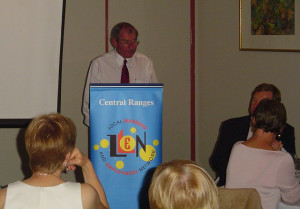
Mr. Thomas pointed out the critical role that communities, with the support of LLEN’s, had in securing positive outcomes for young people making the transition form school to work and further education. He also pointed out that the VLESC was establishing a steering committee for two projects. These two projects are:
- Local Planning of TAFE delivery to 15 to 24 year-olds [Project #9]
- TAFE Delivery to Young People [Project #11].
Membership of the steering committee is
- Rowena Allen, VLESC member, Committee Chair
- Peter Thomas, VLESC Chair
- Lynne Wannan, VLESC member
- Gerald Burke, VLESC member
- Ray Griffiths, Director, Kangan Institute of TAFE
- Bill Coppinger, Executive Officer, Central Ranges LLEN
Mr. Thomas commended the initiative of the communities across the CRLLEN region for embarking on a process to find ways to organise and synchronise resources to improve post-compulsory education and training.
The second part of the evening was designed to encourage all participants to consider the findings from both State Government research such as OnTrack and specific and detailed CRLLEN research, including both the environmental scan [Link deleted] and education scan [Link deleted].
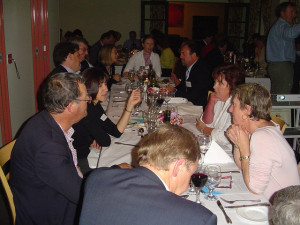
It was the education scan and the Principal’s Forum [Link deleted] staged in February of this year, that lead to the convening of the all-schools-council forum.
Bill Coppinger, Chief Executive Officer of the CRLLEN presented a short [yes really!] outline of the data now available to schools and communities, and focused on the need to involve Local Government and local industry in discussions about how best to support young people.
- This presentation [ PDF ] can be downloaded by following this link CEO Presentation 260405 [962KB]
Participants were then asked to list the key issues facing their school communities, focusing on those students making the transition from school. Participants were also asked to suggest strategies or opportunities they saw to develop links with other schools and/or service providers.
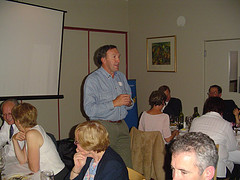 This session was facilitated by John Stafford and David Levens, from Glenlyon Rural Education and Employment Services.
This session was facilitated by John Stafford and David Levens, from Glenlyon Rural Education and Employment Services.
The evening concluded with a presentation from Mr. Stephen Franzi-Ford, President of the association of Victorian School Councils.
Mr. Franzi-Ford pointed out the value in such gatherings, alluding to the fact that one such industry forum hosted by the CRLLEN late last year has resulted in the ASCV developing an initiative with a key industry partner to support a project that will see mid-level managers work and join with School Councils to support business/community links with schools.
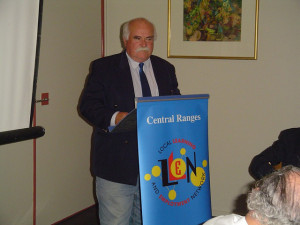
Outcomes and actions
The CRLLEN plans to use the contributions from this forum to establish a planning process to consider new structures to support district-wide planning and provision of post-compulsory education and training.
As a ‘twin’ event of this forum, the upcoming ‘three pillars’ members and industry forum [Link removed] will be looking for new ways to structure post-compulsory education and training, new roles and partnerships for business and community stakeholders and specifically, new opportunities for young people and the communities in which they live.
We have assembled an international panel including:
- Dr. Howard Gardner, Professor of Cognition and Education at the Harvard Graduate School of Education
- Dr. Dahle Suggett, Deputy Secretary, Office of Teaching and Learning, DE&T [Panel Chair]
- Dr. John Prince, Community Partnerships, Transfield Services
- Mr. Howard Kelly [Ret. General Manager of Post Compulsory Pathways Division]
- Mr. Andrew Hocking, Manager, Corporate Community Relations, IBM Australia.
- Mr. Ray Griffiths, Director, Kangan Batman TAFE.
- Ms. Leah Sertori, Castlemaine Secondary College – “Enterprise Teachers for the 21st Century.” project.
Some of the questions we will be posing to Dr. Gardner, Dr. Suggett and the panel include;
- What should be taught?
- How should it be taught?
- What structures and methods are required to prepare young people for the future?
- What role does Business, Industry and the community play in the learning institutions of the future?
- What are the implications for the communities served by the Central Ranges LLEN?
Once completed, the CRLLEN will have the basis of a proposal to consider a new form of Area Governance, a co-operative alliance between business, community and the education sectors, designed to provide better and more targeted services for individuals living in the Macedon, Mitchell and Murrindindi Shires.


